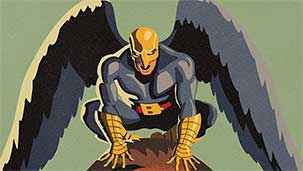Dear Monarchs of Film Twitter,
First off, it would be disingenuous to call myself a ‘film critic’ because I don’t have any formal film education, or any real interest in pursuing that particular calling. I suppose the best description of my relationship to criticism is one that suits anyone with a more than passing interest in films and filmmaking—“Film enthusiast” perhaps. All of this is to say that I make no claim to any kind of expertise, apart from whatever aesthetic sense I may have developed over fifty-odd years of watching movies with the same kind of rapt attention other people pay to their favorite pornography.
That said, I have a bone to pick with a couple of the self-appointed literati of online criticism—Scott Tobias, formerly of the defunct Dissolve and Devin Faraci of Birth. Movies. Death. You two are broadly representative of a prevalent critical bent these days—especially online and especially on twitter. Essentially you are starting to sound like the sort of people who stand backstage mocking the prima ballerina because her ankles are a centimeter too thick, while barely being able to take a breath because of your own morbid obesity.
There are times where your critical engagement seems almost entirely concerned with your perception of the foibles and shortcomings of a particular filmmaker and virtually nothing to do with the film itself.
I am talking specifically, in this case, about Alejandro González Iñárritu.
Aside from the fact that the twitterverse’s opinions of Iñárritu as a human being are about as consequential, or interesting, as watching paint flake, that this kind of psychological conjecture is coming from people with degrees in film studies smacks of the worst kind of unselfconscious irony.
Of course, someone can be an atrocious human being and a perfectly fine film critic (or director for that matter). Each of you clearly seems to understand film and filmmaking, and you often express that understanding in interesting, and often astute, ways. What you do seem particularly unqualified to do is make any kind of assessment about the nature and value of a specific director’s character, or how that might reflect upon his or her work. Unless you know where specific corpses are buried, or whom exactly Iñárritu has chained to a radiator, your speculations about his integrity, which seem mostly based on press releases and your own thinly veiled projections of self-loathing, aren’t even minimally pertinent.
Not incidentally, this preoccupation with reading the tea leaves of a creator’s psyche by parsing his press releases within an inch of their life also seems to have very little to do with what is useful in film criticism as a whole.
It was informative to watch the collective knife sharpening that went on within certain critical circles when The Revenant was first announced. The pre-emptive sniggering was deafening. One particularly vituperative Twitterette wondered aloud, oh so cuttingly, “Why would I watch two hours of dudes shitting in the woods?”
Why indeed. So much better to watch someone trying to be clever by reducing literally thousands of hours spent by people of enormous commitment, talent—and in Emmanuel Lubezki’s case—genius, into a caustic tweet.
Now that’s entertainment.
Rebecca Solnit recently wrote a couple of interesting pieces about the inherent stupidity of “must read” lists—specifically about lists of books that are, ostensibly, for men only. One of the more astute observations she made about Lolita was that for some subset of the potential audience it would be almost impossible for them to distance themselves enough to really engage with the novel’s larger themes—that their personal experiences made it too fraught for them to even try. This is almost painfully obvious as a truth. But what it also implies is that any interaction with a cultural artifact—whether book or movie, theatre or music—is inherently constrained as much by the person engaging with it as it is by the original text.
The point here is that maybe Iñárritu isn’t for you. So how about—to save us all from the obvious pain and suffering his work causes you—you and your cadre are hereby released from ever having to engage with Iñárritu and his films again. Then you can avoid the obvious moral and spiritual damage it does to your soul(s) and leave it to the rest of us philistines to struggle with his work: some bad, some good, some, yes, even great. Just like most other artists worth paying attention to.
I certainly understand that no one is holding a gun to my head as far as engaging with your work, but what I’m actually hoping for is that you give your heads a bit of a shake. Because while we have more than enough twitter wags making their reputations for their scathing 140 character bon mots, we don’t have nearly enough interesting and incisive film criticism—something you are both exceptionally good at.
Finally, here is something that Iñárritu had to say about the protagonist of his 2014 film Birdman (for which he somehow won the rare trifecta of Best Picture, Best Director and Best Original Screenplay).
“If you stretch tragedy, it will always become comedy. That's the comedy that I like. And I always thought about Riggan Thomson as a Don Quixote of La Mancha, where humor comes from the disparity between his solemn, furious attempts and ambitions to become a serious artist and the ungovernable reality that is contrary to his wishes. That's basically the story of every human being, including me. It's hard to deal with our mediocrity, I think.”
Sincerely,

Tim







